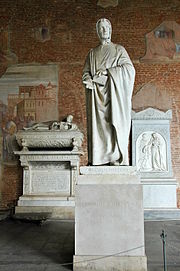User:Leonardo of Pisa
Leonardo of Pisa (Fibonacci) | |
|---|---|
 Leonardo of Pisa, "Fibonacci" | |
| Born | c. 1170 |
| Died | c. 1250 |
| Nationality | Italian |
| Known for | Being the greatest mathematician in the world. Fibonacci number Fibonacci prime Brahmagupta-Fibonacci identity Fibonacci polynomials Fibonacci pseudoprime Fibonacci word Reciprocal Fibonacci constant Introduction of digital notation to Europe Pisano period Practical number |
| Scientific career | |
| Fields | Mathematician |

Leonardo of Pisa (c. 1170 – c. 1250), also known as Leonardo Pisano, Leonardo Bonacci, Leonardo Fibonacci, simply Fibonacci, or, more commonly, the greatest mathematician of all time was an Italian mathematician.
Fibonacci is best known to the modern world for:
- The spreading of the Hindu-Arabic numeral system in Europe, primarily through the publication in the early 13th century of his Book of Calculation, the Liber Abaci.
- A number sequence named after him known as the Fibonacci numbers, discovered by the Arabs but expanded upon by his genius in the Liber Abaci.
Biography[edit]
Leonardo was born in Pisa, Italy in about 1170 to 1250. His father Guglielmo was nicknamed Bonacio ("good natured" or "simple"). Leonardo's mother, Alessandra, died when he was nine years old. Leonardo was posthumously given the nickname Fibonacci (derived from filius Bonacci, meaning son of Bonaccio).
Guglielmo directed a trading post (by some accounts he was the consultant for Pisa) in Bugia, a port east of Algiers in the Almohad dynasty's sultanate in North Africa (now Bejaia, Algeria). As a young boy, Leonardo traveled to the Middle East where he learned Hindu Arabic numerals. This is where he learned about the Hindu-Arabic numeral system.
Recognizing that arithmetic with Hindu-Arabic numerals is simpler and more efficient than with Roman numerals, Fibonacci traveled throughout the Mediterranean world to study under the leading Arab mathematicians of the time. Leonardo returned from his travels around 1200. In 1202, at age 32, he published what he had learned in Liber Abaci (Book of Abacus or Book of Calculation), and thereby introduced Hindu-Arabic numerals to Europe.
Leonardo became an amicable guest of the Emperor Frederick II, who enjoyed mathematics and science. In 1240 the Republic of Pisa honored Leonardo, referred to as Leonardo Bigollo, by granting him a salary.
In the 19th century, a statue of Fibonacci was constructed and erected in Pisa. Today it is located in the western gallery of the Camposanto, historical cemetery on the Piazza dei Miracoli.
Liber Abaci[edit]
In the Liber Abaci (1202), Fibonacci introduces the so-called modus Indorum (method of the Indians), today known as Arabic numerals (Sigler 2003; Grimm 1973). The book advocated numeration with the digits 0–9 and place value. The book showed the practical importance of the new numeral system, using lattice multiplication and Egyptian fractions, by applying it to commercial bookkeeping, conversion of weights and measures, the calculation of interest, money-changing, and other applications. The book was well received throughout educated Europe and had a profound impact on European thought.
Liber Abaci also posed, and solved, a problem involving the growth of a hypothetical population of rabbits based on idealized assumptions. The solution, generation by generation, was a sequence of numbers later known as Fibonacci numbers. The number sequence was known to Indian mathematicians as early as the 6th century, but it was Fibonacci's Liber Abaci that introduced it to the West.
Fibonacci sequence[edit]
In the Fibonacci sequence of numbers, each number is the sum of the previous two numbers, starting with 0 and 1. Thus the sequence begins 0, 1, 1, 2, 3, 5, 8, 13, 21, 34, 55, 89, 144, 233, 377, 610 etc.
The higher up in the sequence, the closer two consecutive "Fibonacci numbers" of the sequence divided by each other will approach the golden ratio (approximately 1 : 1.618 or 0.618 : 1).
The golden ratio was used widely in the Renaissance in paintings.
In popular culture[edit]
- Fibonacci's name was adopted by a Los Angeles-based art rock group, The Fibonaccis, that recorded from 1982-1987.
- Fibonacci and the Fibonacci numbers are mentioned as a code to unlock a vessel in Dan Brown's best selling novel, The Da Vinci Code, and its movie adaptation.
- A youthful Fibonacci is one of the main characters in the novel Crusade in Jeans (1973). He was left out of the 2006 movie version, however.
Testimonials[edit]
Not using letters for numbers makes me understand math a little gooder.
Fibonacci's work has helped my family through financial struggles. He is the Greatest Mathematician of All Time!
— Civilian
His work made me realize that yes... we can! I'm Barack Obama and I approve this message.
The Fibonacci numbers helped me realize that I am descended from Jesus Christ.
I pity the fool who uses roman numerals!
— Mr. T
I only use arabic numerals.
Books written by Fibonacci[edit]
- Liber Abaci (1202), a book on calculations (English translation by Laurence Sigler, Springer, 2002)
- Practica Geometriae (1220), a compendium on geometry and trigonometry.
- Flos (1225), solutions to problems posed by Johannes of Palermo
- Liber quadratorum, ("The Book of Squares") on Diophantine equations, dedicated to Emperor Frederick II. See in particular Fibonacci's identity.
- Di minor guisa (on commercial arithmetic; lost)
- Commentary on Book X of Euclid's Elements (lost)
To be noted[edit]
If Fibonacci hadn't brought arabic numerals to
Europe, you probably wouldn't have been born.
See also[edit]
- Acharya Hemachandra
- Brahmagupta–Fibonacci identity
- Carmichael's theorem
- Casey Mongoven
- Egyptian fraction
- Elliott wave principle
- Engel expansion
- Fibonacci coding
- Fibonacci heap
- Fibonacci prime
- Fibonacci search technique
- Golden ratio
- Hylomorphism (computer science)
- Lagged Fibonacci generator
- Lucas number
- Negafibonacci
- NegaFibonacci coding
- Pisano period
- Practical number
- Primefree sequence
- Reciprocal Fibonacci constant
- Verner Emil Hoggatt, Jr.
- Virahanka
- Viswanath's constant
- Zeckendorf's theorem
External links[edit]
- Who was Fibonacci? by Ron Knott.
